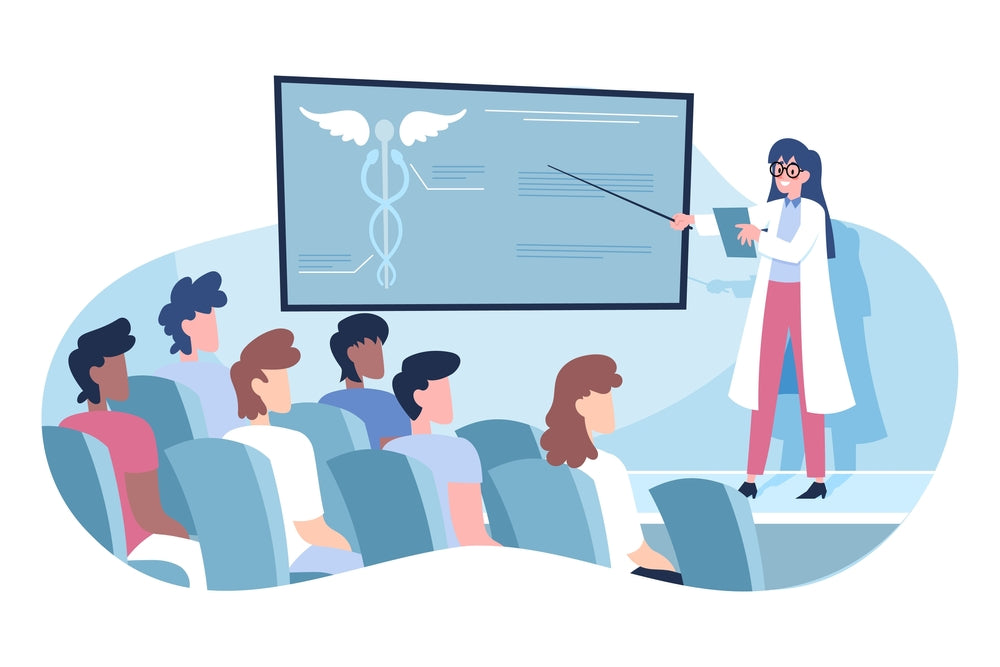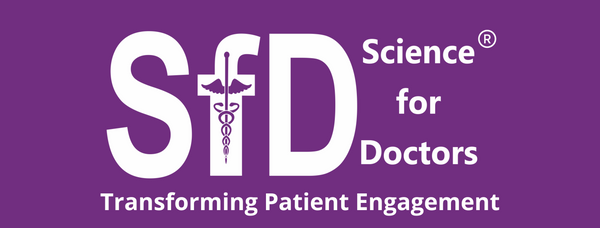
The Importance of Continuing Education for Healthcare Professionals: Staying Ahead in the Medical Field
Share
Continuing education (CE) is essential for healthcare professionals to stay updated with the latest advancements, technologies, and treatment methods in the medical field. As medical research, healthcare protocols, and technological innovations rapidly evolve, continuous learning becomes a critical component for improving patient outcomes, professional development, and ensuring competitive advantage in Healthcare Industry.
1. Enhancing Patient Care and Treatment Outcomes
One of the primary benefits of continuing medical education (CME) is its direct impact on patient care. By regularly updating their knowledge and skills, healthcare professionals can deliver cutting-edge, evidence-based treatments, leading to better patient outcomes. CME courses help professionals stay current on the latest healthcare guidelines, drug treatments, and surgical procedures, improving the overall quality of care.
2. Keeping Pace with Technological Advancements in Healthcare
The healthcare industry is at the forefront of technological innovation. With the increasing use of telemedicine, AI-driven diagnostics, robotic surgeries, and electronic health records (EHR), it’s crucial for healthcare workers to stay informed about the latest medical technologies. Continuing education equips professionals with the necessary technical skills and understanding to seamlessly incorporate these innovations into their practice.
3. Adapting to New Medical Guidelines and Protocols
Medical science is always evolving, with new research, drugs, and therapies constantly emerging. Continuing education ensures that healthcare providers can stay ahead of changing medical guidelines, treatment protocols, and regulations, ensuring compliance with healthcare standards. Keeping updated with new developments helps healthcare professionals avoid outdated practices and ensures they provide the safest, most effective care to their patients.
4. Maintaining Medical Licensure and Certification
Most healthcare professionals are required to complete continuing education courses to maintain their licensure and certifications. Fulfilling these mandatory CME requirements ensures that they remain competent and qualified in their respective fields, thus preserving professional standards across the healthcare industry. In addition, these certifications enhance credibility and patient trust.
5. Advancing Professional Development in Healthcare Careers
Continuing education fosters career growth by allowing healthcare professionals to expand their skill sets and expertise. Whether exploring a new specialty like geriatrics, oncology, or emergency medicine, or seeking leadership and administrative roles, continuous learning opens the doors to new opportunities. Engaging in professional development courses and certifications also enhances job satisfaction and career longevity.
6. Staying Competitive in the Healthcare Field
In an increasingly competitive healthcare job market, continuing education offers professionals a significant advantage. By continually updating their skills, healthcare workers can remain relevant, increase job security, and open the door to career advancement opportunities. Employers value professionals who are committed to lifelong learning, which in turn leads to improved employability.
7. Addressing Emerging Public Health Challenges
Healthcare professionals play a critical role in addressing global health crises like pandemics, chronic diseases, and antibiotic resistance. Through continuing education, they gain the knowledge and tools needed to tackle these pressing public health issues. From learning new preventive measures to mastering the latest treatment techniques, healthcare workers are better equipped to make a lasting impact on public health outcomes.
8. Meeting Ethical and Professional Standards in Healthcare
Continuing education programs emphasize the importance of ethical decision-making, legal responsibilities, and professionalism in healthcare. By staying current with ethical standards and best practices, healthcare professionals uphold the trust of their patients and contribute to the integrity of the medical profession.
Helpful Resources for Continuing Medical Education (CME)
To excel in the healthcare industry, professionals can explore valuable CME resources through platforms like Science for Doctors and SMS Scientific. These platforms offer a range of accredited CME courses, certifications, and workshops designed to enhance medical knowledge, clinical skills, and career development.
Conclusion
Continuing education is not just a requirement; it is a crucial component of professional growth and healthcare excellence. By staying current with the latest medical advancements, technologies, and best practices, healthcare professionals can significantly improve patient care, ensure career advancement, and stay competitive in the evolving medical landscape. Engaging in lifelong learning ensures that healthcare providers remain at the forefront of their profession, ultimately benefiting both their patients and the healthcare system at large.
1. Enhancing Patient Care and Treatment Outcomes
One of the primary benefits of continuing medical education (CME) is its direct impact on patient care. By regularly updating their knowledge and skills, healthcare professionals can deliver cutting-edge, evidence-based treatments, leading to better patient outcomes. CME courses help professionals stay current on the latest healthcare guidelines, drug treatments, and surgical procedures, improving the overall quality of care.
2. Keeping Pace with Technological Advancements in Healthcare
The healthcare industry is at the forefront of technological innovation. With the increasing use of telemedicine, AI-driven diagnostics, robotic surgeries, and electronic health records (EHR), it’s crucial for healthcare workers to stay informed about the latest medical technologies. Continuing education equips professionals with the necessary technical skills and understanding to seamlessly incorporate these innovations into their practice.
3. Adapting to New Medical Guidelines and Protocols
Medical science is always evolving, with new research, drugs, and therapies constantly emerging. Continuing education ensures that healthcare providers can stay ahead of changing medical guidelines, treatment protocols, and regulations, ensuring compliance with healthcare standards. Keeping updated with new developments helps healthcare professionals avoid outdated practices and ensures they provide the safest, most effective care to their patients.
4. Maintaining Medical Licensure and Certification
Most healthcare professionals are required to complete continuing education courses to maintain their licensure and certifications. Fulfilling these mandatory CME requirements ensures that they remain competent and qualified in their respective fields, thus preserving professional standards across the healthcare industry. In addition, these certifications enhance credibility and patient trust.
5. Advancing Professional Development in Healthcare Careers
Continuing education fosters career growth by allowing healthcare professionals to expand their skill sets and expertise. Whether exploring a new specialty like geriatrics, oncology, or emergency medicine, or seeking leadership and administrative roles, continuous learning opens the doors to new opportunities. Engaging in professional development courses and certifications also enhances job satisfaction and career longevity.
6. Staying Competitive in the Healthcare Field
In an increasingly competitive healthcare job market, continuing education offers professionals a significant advantage. By continually updating their skills, healthcare workers can remain relevant, increase job security, and open the door to career advancement opportunities. Employers value professionals who are committed to lifelong learning, which in turn leads to improved employability.
7. Addressing Emerging Public Health Challenges
Healthcare professionals play a critical role in addressing global health crises like pandemics, chronic diseases, and antibiotic resistance. Through continuing education, they gain the knowledge and tools needed to tackle these pressing public health issues. From learning new preventive measures to mastering the latest treatment techniques, healthcare workers are better equipped to make a lasting impact on public health outcomes.
8. Meeting Ethical and Professional Standards in Healthcare
Continuing education programs emphasize the importance of ethical decision-making, legal responsibilities, and professionalism in healthcare. By staying current with ethical standards and best practices, healthcare professionals uphold the trust of their patients and contribute to the integrity of the medical profession.
Helpful Resources for Continuing Medical Education (CME)
To excel in the healthcare industry, professionals can explore valuable CME resources through platforms like Science for Doctors and SMS Scientific. These platforms offer a range of accredited CME courses, certifications, and workshops designed to enhance medical knowledge, clinical skills, and career development.
Conclusion
Continuing education is not just a requirement; it is a crucial component of professional growth and healthcare excellence. By staying current with the latest medical advancements, technologies, and best practices, healthcare professionals can significantly improve patient care, ensure career advancement, and stay competitive in the evolving medical landscape. Engaging in lifelong learning ensures that healthcare providers remain at the forefront of their profession, ultimately benefiting both their patients and the healthcare system at large.
